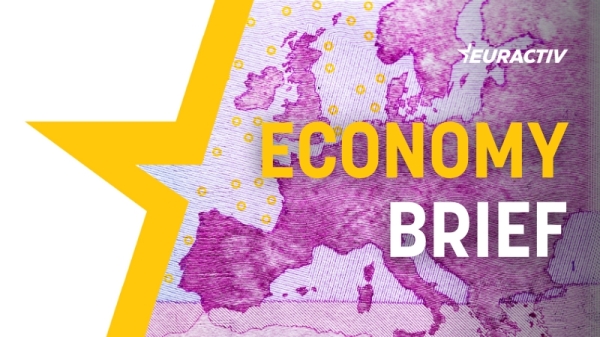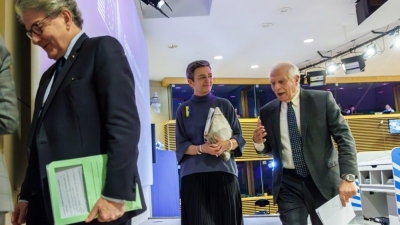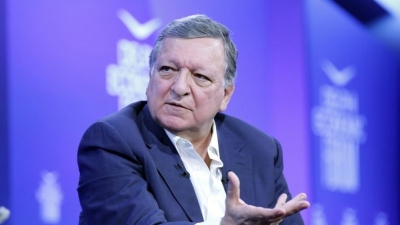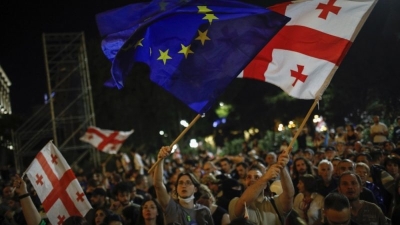‘Nothing is sacred’: How the CSDDD saga lifted the veil on Brussels politics

Any Brussels observer can see that in the last month, pre-election fever has been swooping through the bubble like a wind of change that reshuffles all cards and makes weird things happen.
One such example was this Wednesday (28 February), when all eyes were focused squarely on Italy to see whether its hesitant envoys would move the needle in favour or against the bloc’s Corporate Sustainability and Due Diligence Directive (CSDDD), the divisive yet crucial law that aims to hold corporations accountable for labour- and environment-related abuses across their supply chain.
Everyone assumed the German position was all but set in stone – and Italy was the only other large member state openly questioning the feasibility of the CSDDD – and therefore the one to bet on.
Instead, the needle was moved against the directive by as many as 12 other member states, powered by France’s major U-turn on its support for the law. Political chaos ensued.
Lara Wolters (S&D), the European Parliament’s chief on the legislative file, didn’t hold back and chastised industry groups in France and Germany for banking on the fact they “have their leaders on speed dial” and member states for “walk[ing] back on commitments” as an act of “flagrant disregard for the European Parliament as co-legislator”.
Other MEPs on the centre-left side of the political spectrum, industry associations and civil society groups shared Wolters’ bewilderment on the fate of the law. It had already made it through trilogues, and now risks falling into oblivion if passed on to the next legislative mandate (for reasons including its less obvious charm to the next expected centre-right parliament majority, as well as its lesser-priority ranking among a batch of other key open legislative files).
However, Belgian diplomats holding the presidency of the Council showed some unwavering determination after the vote blunder, and were quick to move to plan B.
They now aim to use the next three weeks to present an amended text that can snap up support from a qualifying majority of member state delegates in time for getting the final stamp of approval at April’s plenary session of the Parliament – the last one before the early-June elections.
If hopes that the CSDDD would ever see the light were already running thin, Wednesday’s political defections quashed them even further, making the Belgian ambition to save the file at the eleventh hour look slightly misplaced.
At all costs – Time to turn to Realpolitik
However, two sources close to negotiations – from two independent sustainability-focussed alliances – told Euractiv on Friday that the plan is not that unrealistic after all, as some key negotiators seem to have switched on their Realpolitik mode. They are now more determined than ever to get the law over the finishing line at all costs – even if that means sacrificing provisions that had been strenuously sought after during negotiations last year.
“Any law in this case is absolutely better than no law,” one source told Euractiv, referring to the crucial role of having EU rules on corporate accountability and liability align with existing international requirements – first and foremost those that have been set out at OECD level.
“Nothing is sacred at this stage,” another source said. “The mood now is that what matters is to save the principle of the law, so there’s nothing that can’t be sacrificed. It is the time to concede.”
Wolters will be taking that motto very literally, the source continued. She will be “slashing through the text” of the directive, and going through the list of “what each country hates” to loosen requirements and increase her chances of getting more member states, as well as the European People’s Party (EPP) – which also “wants the current draft gone” – on board, they said.
Her goal: get shadow rapporteurs from all parties – mostly Axel Voss, the MEP in charge of the file for the EPP – to support the new text, so as to present it as a “joint shadow approach” to Belgian officials as soon as next week. Earning the EPP’s backing right away would increase the likelihood that member states are confident their desired amendments make it smoothly through the plenary.
“Member states will not want to negotiate it with the Parliament if there’s a chance it gets blocked in plenary,” the source said.
“I hate to say this, but the letter of concerns put forward by member states this week would offer the most useful material” for Wolters’ amendments, the second source agreed.
Among the CSDDD items more likely to be tweaked for political leeway, both said, the employee threshold that determines what companies fall within scope – which the French now want increased from 500 to 5,000 – was one of the most obvious.
“It is ultimately only the very large companies that are targeted by civil lawsuits” for human rights or environmental violation, so those are the ones that needed to remain in scope, one source argued.
Wolters would be considering hiking the threshold to 1,000 employees, “although even 2,000 or 3,000 would be feasible” without significantly watering down the effectiveness of the law, the other source said.
However, the source added that diplomats at the member state level also needed to step up their pragmatism for the amended CSDDD text to stand a chance of making it to plenary in such a limited timeframe – and that Belgian negotiators in particular needed to target the countries with larger political leverage.
“Belgium realistically doesn’t have the leverage” to sway other countries towards supporting the new version of the law, he said. Assuming Germany would reiterate its opposition to the law, the source said it was France that held the most strategic leverage to also get the one other larger country – Italy – on board and thereby positively shift the overall balance.
Overall, both agreed that the volte-face orchestrated at the EU ambassadors meeting on Wednesday marked a somewhat unprecedented event, corroborating the feeling that member states are indeed engaging in heavier political posturing and re-positioning than in the past.
“To send a concern letter that extensive the night before a vote” fell outside the normal perimeters of political fair play, one admitted, with the second source adding that political turnarounds on other EU laws had “never gone this far. Not after trilogues”.
Had such a large-scale U-turn happened one year ago, the source said, “the law would have gone back to trilogue”.
Instead, the next few weeks may set a precedent for EU lawmaking and show us that, if a draft law can be transformed that extensively and still make it to the finishing line, pre-electoral politics means weird things can happen indeed.
Chart of the Week
The Corporate Human Rights Benchmark, compiled by the NGO World Benchmarking Alliance (WBA), aims to provide a “a comparative snapshot” of large companies’ human rights and sustainability practices.
The WBA’s most recent ranking, republished below, suggests that European companies active in the apparel and extractive sectors fare relatively well compared to their global counterparts: three EU-based companies are ranked inside the top five, and six inside the top 20.
Economic Policy Roundup
Experts express pessimism about Russia’s long-term economic prospects, despite the fact that the country is expected to grow three times faster than Europe this year. Janis Kluge, a senior associate at the German Institute for International and Security Affairs (SWP), noted that Europe still has “all the ingredients for long-term growth”, including “some really competitive industries”. Conversely, Russia — which has lost hundreds of thousands of young people to emigration or directly to the war over the past two years — has “lost its future”. Kluge’s words were echoed by Alexander Kolyandr, financial analyst and former credit strategist at Credit Suisse: “My opinion is that the current economic model cannot exist over the long run. The growth of 2023 and 2024 is growth borrowed from the future. When the day of reckoning will come, I don’t know. But history tells us that payback always comes.” Read more.
Conservatives throw spanner into new EU joint borrowing debate. Centre-right and national-conservative groups in the European Parliament have voiced strong opposition to a renewed joint-debt programme at the EU level. The Recovery and Resilience Facility (RRF) was “designed as an exceptional, unique one-time instrument in a time of an unprecedented crisis”, Siegfried Mureşan, Vice Chair of centre-right EPP group in the European Parliament, told Euractiv. This comes after calls for a new joint borrowing programme have mushroomed over the last few weeks, with Economy Commissioner arguing that the finance needs for joint priorities would not diminish after 2026 and multiple think-tanks warning of a public financing gap, notably for green investments. Read more.
Political volte-face hits EU supply chain law. Half of the bloc’s 27 member states effectively blocked progress on the Corporate Sustainability and Due Diligence Directive (CSDDD) on Wednesday, after France backpedalled on its previous support and requested that a vast portion of European companies are excluded from the scope of the legislation. Belgian negotiators are now targeting a mid March deadline to propose an amended text that can garner enough support to ensure the law earns to the final stamp of approval. Read more.
Germany’s slow implementation of EU law highlights risks to European competitiveness. Germany takes longer than many of its peers to implement EU directives, the European Commission’s single market report shows, pointing to the wider threat the bloc’s lethargic policy implementation poses to competitiveness. On average, nearly two years go by between single-market legislation passing in Brussels and it entering statute books in Berlin, which places Germany in the bottom third among EU countries. By comparison, it takes less than one year in France. Read more.
European Parliament approves a resolution calling on the European Investment Bank (EIB) to repeal restrictions on financing ammunition and weapons production. “[The Parliament] emphasises the need to make the most effective use of all the instruments at the EIB’s disposal [and] calls on the EIB to enhance its support… to the European defence industry,” reads the Greens/EFA-sponsored resolution, which passed on Wednesday (28 February) by 455 votes to 64, with 26 abstentions. The vote was held on the same day that the Luxembourg-based institution’s recently appointed president, Nadia Calviño, told a plenary session of the European Parliament that the EIB would “step up” its “support for European industry in the areas of security and defence”. Both the vote and Calviño’s comments come amid growing pressure on EU countries to ramp up investments in security and defence following Russia’s full-scale invasion of Ukraine in February 2022. Read more.
EU sanctions on Russia are being “massively circumvented” via third countries. A research note by the Lille-based IÉSEG School of Management found “statistical evidence” of sanctions circumvention for so-called “high priority items”, which are subject to EU export restrictions and include manufacturing equipment and electrical components with potential military applications. The report found that EU exports of such items to Turkey, the United Arab Emirates (UAE), Kazakhstan, and other “Kremlin-friendly” countries surged by €2.979 billion, or 81.55%, in the October 2022 – September 2023 period compared to the same period the previous year. “The surge of these purchases by third countries is too huge to be entirely caused by an increase in local demand, so that it can be suspected that a big part was thereafter exported to Russia,” the study noted. Read more.
Read more with Euractiv




